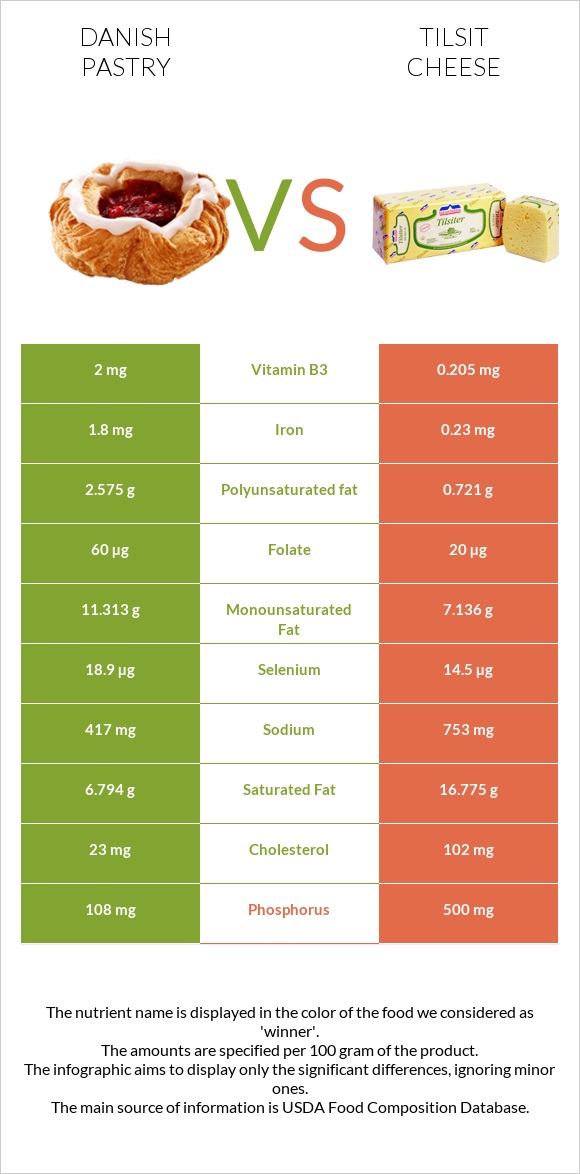Danish pastry vs. Tilsit cheese — In-Depth Nutrition Comparison
Compare
What are the main differences between danish pastry and tilsit cheese?
- Danish pastry is richer in iron and manganese, yet tilsit cheese is richer in vitamin B12, calcium, phosphorus, zinc, and vitamin A.
- Tilsit cheese's daily need coverage for vitamin B12 is 79% higher.
- Danish pastry has 27 times more manganese than tilsit cheese. Danish pastry has 0.351mg of manganese, while tilsit cheese has 0.013mg.
- Danish pastry contains less sodium.
- Tilsit cheese has a lower glycemic index than danish pastry.
We used Danish pastry, cheese and Cheese, tilsit types in this comparison.
Infographic

Infographic link
Mineral Comparison
Mineral comparison score is based on the number of minerals by which one or the other food is richer. The "coverage" charts below show how much of the daily needs can be covered by 300 grams of the food.
| Contains more MagnesiumMagnesium | +15.4% |
| Contains more PotassiumPotassium | +50.8% |
| Contains more IronIron | +682.6% |
| Contains more CopperCopper | +242.3% |
| Contains less SodiumSodium | -44.6% |
| Contains more ManganeseManganese | +2600% |
| Contains more SeleniumSelenium | +30.3% |
| Contains more CalciumCalcium | +1900% |
| Contains more ZincZinc | +400% |
| Contains more PhosphorusPhosphorus | +363% |
Vitamin Comparison
Vitamin comparison score is based on the number of vitamins by which one or the other food is richer. The "coverage" charts below show how much of the daily needs can be covered by 300 grams of the food.
| Contains more Vitamin CVitamin C | +∞% |
| Contains more Vitamin EVitamin E | +∞% |
| Contains more Vitamin B1Vitamin B1 | +211.5% |
| Contains more Vitamin B3Vitamin B3 | +875.6% |
| Contains more Vitamin KVitamin K | +∞% |
| Contains more FolateFolate | +200% |
| Contains more Vitamin AVitamin A | +611.4% |
| Contains more Vitamin B2Vitamin B2 | +38.1% |
| Contains more Vitamin B5Vitamin B5 | +13.8% |
| Contains more Vitamin B6Vitamin B6 | +62.5% |
| Contains more Vitamin B12Vitamin B12 | +950% |
All nutrients comparison - raw data values
| Nutrient |  |
 |
DV% diff. |
| Vitamin B12 | 0.2µg | 2.1µg | 79% |
| Calcium | 35mg | 700mg | 67% |
| Phosphorus | 108mg | 500mg | 56% |
| Saturated fat | 6.794g | 16.775g | 45% |
| Protein | 8g | 24.41g | 33% |
| Cholesterol | 23mg | 102mg | 26% |
| Zinc | 0.7mg | 3.5mg | 25% |
| Vitamin A | 35µg | 249µg | 24% |
| Iron | 1.8mg | 0.23mg | 20% |
| Sodium | 417mg | 753mg | 15% |
| Manganese | 0.351mg | 0.013mg | 15% |
| Carbs | 37.2g | 1.88g | 12% |
| Polyunsaturated fat | 2.575g | 0.721g | 12% |
| Vitamin B1 | 0.19mg | 0.061mg | 11% |
| Vitamin B3 | 2mg | 0.205mg | 11% |
| Folate | 60µg | 20µg | 10% |
| Monounsaturated fat | 11.313g | 7.136g | 10% |
| Selenium | 18.9µg | 14.5µg | 8% |
| Vitamin B2 | 0.26mg | 0.359mg | 8% |
| Copper | 0.089mg | 0.026mg | 7% |
| Fats | 21.9g | 25.98g | 6% |
| Vitamin K | 6.9µg | 6% | |
| Fiber | 1g | 0g | 4% |
| Choline | 20.1mg | 4% | |
| Calories | 374kcal | 340kcal | 2% |
| Vitamin E | 0.35mg | 2% | |
| Vitamin B6 | 0.04mg | 0.065mg | 2% |
| Potassium | 98mg | 65mg | 1% |
| Vitamin B5 | 0.304mg | 0.346mg | 1% |
| Vitamin C | 0.1mg | 0mg | 0% |
| Net carbs | 36.2g | 1.88g | N/A |
| Vitamin D | 2 IU | 0% | |
| Magnesium | 15mg | 13mg | 0% |
| Sugar | 6.95g | N/A | |
| Tryptophan | 0.089mg | 0.352mg | 0% |
| Threonine | 0.293mg | 0.899mg | 0% |
| Isoleucine | 0.371mg | 1.484mg | 0% |
| Leucine | 0.644mg | 2.548mg | 0% |
| Lysine | 0.43mg | 2.039mg | 0% |
| Methionine | 0.174mg | 0.754mg | 0% |
| Phenylalanine | 0.402mg | 1.358mg | 0% |
| Valine | 0.412mg | 1.752mg | 0% |
| Histidine | 0.205mg | 0.704mg | 0% |
| Omega-3 - DHA | 0.001g | 0g | N/A |
Macronutrient Comparison
Macronutrient breakdown side-by-side comparison
Protein:
8 g
Fats:
21.9 g
Carbs:
37.2 g
Water:
31.4 g
Other:
1.5 g
Protein:
24.41 g
Fats:
25.98 g
Carbs:
1.88 g
Water:
42.86 g
Other:
4.87 g
| Contains more CarbsCarbs | +1878.7% |
| Contains more ProteinProtein | +205.1% |
| Contains more FatsFats | +18.6% |
| Contains more WaterWater | +36.5% |
| Contains more OtherOther | +224.7% |
Fat Type Comparison
Fat type breakdown side-by-side comparison
Saturated fat:
Sat. Fat
6.794 g
Monounsaturated fat:
Mono. Fat
11.313 g
Polyunsaturated fat:
Poly. Fat
2.575 g
Saturated fat:
Sat. Fat
16.775 g
Monounsaturated fat:
Mono. Fat
7.136 g
Polyunsaturated fat:
Poly. Fat
0.721 g
| Contains less Sat. FatSaturated fat | -59.5% |
| Contains more Mono. FatMonounsaturated fat | +58.5% |
| Contains more Poly. FatPolyunsaturated fat | +257.1% |





